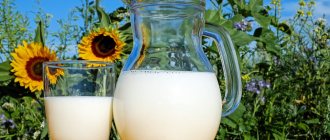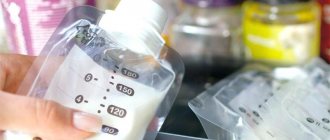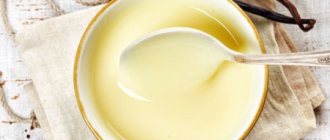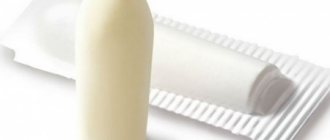Of course, when a child appears, a young mother immediately begins to adapt her own life to this little bundle of happiness. Now her every action is based on not harming the baby. At the same time, every person close to new parents - be it a friend or (especially!) representatives of the older generation - strives to give their own “useful” and “correct” advice. And when it comes to breastfeeding in our country, every mother who has gone through this considers herself a real professional. In addition, if something starts to bother the baby (and this certainly happens to all babies), then the poor mother gets information from everywhere. In the end, the girl is on the verge of a nervous breakdown, the baby is not getting better, and those around her continue to attack her with “important” advice.
Dr. Komarovsky, as a leading pediatrician in Ukraine, advises to exhale and relax. His advice is based on giving comfort and peace of mind to both - mother and her precious child.
No time to read? detailed nutrition chart for a nursing mother
Composition of tea and milk
The usefulness and necessity of tea in the modern world cannot be exaggerated. Not a day goes by without this drink for most of the planet's inhabitants. It not only has a pleasant taste, but also beneficial properties, thanks to which a person receives a boost of vivacity and energy.
The composition of tea includes a number of biologically active elements, the amount of which depends on its variety and processing method. Green tea is considered the most beneficial because less nutrients are lost during its production.
The main components of a drink made from tea tree leaves are essential oils, amino acids, vitamins (carotene, B1, B2, B9, P, nicotinic acid), tannins, pigments, and alkaloids. Caffeine (theine) is one of the alkaloids, thanks to which tea has a tonic effect and increases activity. It is worth noting that green tea contains more caffeine than black tea.
Milk, as a unique and healthy product, contains various vitamins, minerals, proteins, fats, carbohydrates (lactose). The most valuable proteins in this drink are complete proteins, which are represented by casein, albumin, and globulin.
The benefits of milk tea for lactation
During breastfeeding, it is very important for a woman to replenish fluid reserves in the body in sufficient quantities, since milk production directly depends on this. The liquid consumed by the mother must be warm. Since ancient times, grandmothers have recommended drinking tea with milk. But today it is no longer a secret that lactation can be improved with the help of any warm drinks. The effect (in the form of a rush of milk) from drinking a hot drink will be noticeable only if you drink it half an hour before feeding.
However, one cannot argue with the fact that milk tea is necessary for a nursing mother and child not only as a means of improving lactation. This drink is rich in essential nutrients, thanks to which it will be easier for a woman to restore her body after childbirth, improve her condition, and provide the child’s body with the opportunity for proper and rapid development.
Beneficial properties of milk tea:
- Improved well-being, mood, increased activity and energy;
- Improving the functioning of the gastrointestinal tract;
- Normalization of metabolic processes and the process of hematopoiesis in the body;
- Stabilization of blood pressure (black tea increases blood pressure, green tea decreases it);
- Beneficial effect on the functioning of the cardiovascular system;
- Prevention of cancer;
- Has a sedative effect, relieves stress, irritability;
- Strengthens the skeletal system, improves the condition of hair and nails;
- It is a preventative against urolithiasis.
Lifestyle
In addition to genetic predisposition, milk production is affected by negative emotions, lifestyle (sleep, activity, fatigue), and diet.
It is very difficult for a young mother to eliminate negative emotions, but her lifestyle can be adjusted. You need to organize your day in such a way that there are as few unpleasant and unnecessary actions as possible. And the less time you devote to ironing, cleaning, cooking, the better it will be for you, and therefore for your baby. You won't be able to breastfeed well if you don't get enough sleep, rest, or other activities that don't involve your newborn.
A child is a member of the family. And you can’t bring your love for him to the point of pain. Stick to the golden mean. And if you start jumping up at night to see your beloved child every 5 minutes, you risk losing your milk altogether. So don’t forget about yourself, because you are still one!
Possible harm of milk tea during lactation
Like any product used in excessive quantities, milk tea can also cause harm and anxiety to a nursing mother. In addition, the presence of two ingredients in milk tea can cause a negative reaction on the part of the baby to some components of the drink. It is important to consider the possible benefits and harms before consuming a drink for a breastfeeding woman.
Caffeine
Since tea contains a sufficient amount of caffeine, you should be careful about the amount of it consumed. Excessive exposure of caffeine to a baby through breast milk can cause irritability, nervous excitability, anxiety, and poor sleep. The nervous system of a newborn is quite vulnerable to the influence of extraneous factors, so it is important to control the amount of caffeine entering his body.
Important! Excessive amounts of milk tea during lactation leads to a decrease in the amount of iron in breast milk.
Nursing mothers are advised to drink only black tea, as it contains little caffeine (unlike green tea). But even black tea in excessive quantities can cause health problems not only for the baby, but also for the nursing mother.
Allergy to milk protein
The complete proteins that make up milk are quite allergenic and difficult to digest by the child’s body. A newborn may develop an allergy to cow's milk protein in the form of a rash, irritation and redness throughout the body, abdominal pain, and problems with bowel movements. It is important to monitor the baby's reaction and stop consuming dairy products for a while if changes in the baby's behavior are detected.
Contraindications
It is not recommended to drink tea with milk in the following cases:
- high blood pressure of a nursing mother;
- presence of excess weight or a tendency to gain it (in this case, it is especially undesirable to drink tea with added sugar);
- if a woman suffers from constipation;
- individual intolerance to the components of the drink;
- lactase deficiency in the baby.
Benefits of breastfeeding
Many pages have been written about the benefits of breastfeeding. However, it is necessary to provide the main evidence that breastfeeding is a necessary condition for the proper development of the child.
- Mother's milk always has the optimal temperature, it is ideally pure, contains substances that help the child's body digest food, and with mother's milk the child receives immunity that protects him from infections.
- By naturally feeding your child, you save your family budget, since formula milk is not cheap.
- This is a time saver. Breastfeeding is faster than first going to the store, then boiling a bottle, pouring in the formula, heating it, stirring it, letting it cool, washing it - and so on all the time.
- Infecting the child with an intestinal infection is excluded. And it is not always possible to ensure ideal cleanliness when preparing and storing mixtures, especially in the summer. How does it end? Children's infectious diseases hospital.
- You can feed your baby at any time, no matter where you are.
- Over time, the composition of mother's milk changes, which ideally matches the baby's growing body.
- By underestimating the benefits of breastfeeding, you may not be aware of the number of problems that can arise if your baby develops an intolerance to cow's milk. Think about how much nerves and money you will spend on feeding your baby?
Is it possible to drink tea with milk during lactation?
When the question arises about whether it is possible to drink tea with milk while breastfeeding, the answer will definitely be as follows - the drink is useful for both mother and baby, only in moderate doses and in the absence of serious contraindications for both. This drink will undoubtedly help restore strength, improve health and provide the body with vital vitamins and minerals. The opinion that milk tea is the best way to improve lactation is not considered unambiguous, but it cannot be banned either. Because whether it is milk tea, compote, fruit drink, juice or just warm water, they affect the amount of milk production in the same way. The main rule is to drink half an hour before feeding. Then the flow of milk will be noticeable, and the effect will be maximum.
Important! You should not consume whole milk in large quantities, because the baby’s digestive system cannot yet fully digest the complex cow protein in its composition. It is better not to provoke the baby’s still weak body to allergic reactions.
If a child has been diagnosed with lactase deficiency (a deficiency of the lactase enzyme, which is necessary for processing lactose contained in milk), the nursing mother should stop drinking whole milk altogether. This will help avoid colic and increased gas formation in the baby.
Which tea to choose?
It is definitely better for a nursing mother to choose black tea because it contains a small dose of caffeine. If the child does not have a negative reaction to green tea, then you can drink it, most importantly in moderation. It is advisable to choose large leaf tea. It is especially important to avoid tea bags, as well as tea with added other herbs (potential allergens) or flavorings.
Admission rules
To improve lactation, it is advisable to drink tea with milk in compliance with some recommendations.
Rules for drinking tea with milk:
- to increase milk production, it is advisable to drink milk tea 30-40 minutes before breastfeeding;
- It is advisable to use milk with a fat content of about 2.5%;
- the proportion of milk and tea should be approximately 1:3;
- The tea needs to be infused for three minutes; a nursing mother should not make a strong drink;
- It is advisable not to add sugar or add only half a teaspoon;
For the first time after giving birth, it is better to try the components of milk tea separately on different days and monitor the baby’s reaction. If no changes in the child’s behavior were noticed in response to both ingredients, then you can start drinking tea with milk.
How much tea with milk can you drink during breastfeeding?
For the first time when breastfeeding a nursing mother, a few sips of milk tea will be enough. If the baby’s behavior has not changed and there is no reason for concern, then the amount of drink can be gradually increased. The daily dose of milk tea should not exceed three cups of 300-400 ml. A larger amount of drink can negatively affect the child’s condition, provoke allergies or tummy problems.
Diet of a nursing mother by month: Komarovsky recommends
The birth of a child obliges the mother to eat properly; a well-designed monthly diet for a nursing mother can significantly help with this (Komarovsky). Any food absorbed by a woman at this moment will be absorbed into the baby’s body after some time, so it is extremely important to follow such a diet and pay double attention to your personal diet.
Komarovsky's recommendations for a nursing mother
The baby’s body can react to foods in different ways: the child may experience colic, gas, all kinds of rashes, stomach and intestinal disorders, and constipation.
The attending physician under whose supervision the child is, in such cases can and should advise the woman in detail regarding her diet.
But there are proven general rules that any mother should know and follow while feeding her baby.
The rules developed by Dr. Komarovsky consist of the following points:
- Complete exclusion from the diet of canned, refined foods, semi-finished products, and smoked meats.
- Careful monitoring of nutritional balance. The diet should include fermented milk products, fruits, bread, vegetables, fish, vegetable and animal oils.
- Divide the diet into at least 4 meals per day. For mothers who want to quickly lose weight after childbirth - for 6 servings. It is fractional meals that normalize metabolic processes in a woman’s body and provide the baby with the necessary nutrition.
- Adequate fluid intake.
- Cooking food by steaming, stewing or baking. Smoked and fried foods are not recommended.
- Including whole grain cereals in the diet: buckwheat, barley, oats.
- Consumption of fermented milk products, including various types of processed milk: kefir, fermented baked milk, cottage cheese.
- Consumption of fish, seafood, spinach to maintain the optimal amount of iodine, calcium, and iron in the body.
In addition to the recommended diet during the feeding period, there is a list of products, the presence of which should be monitored, and in special cases completely excluded. The Komarovsky list includes the following food products:
- boiled, smoked, sausages;
- fish caviar and its varieties with excessive fat content;
- fat meat;
- eggs in any form and preparation;
- pickled products, canned food;
- mayonnaise, ketchup, spicy foods, spices, seasonings,
- chicken, meat broth;
- cow's milk;
- wheat, semolina, oatmeal porridge;
- alcohol, coffee, cocoa, as well as drinks containing dyes, carbonated water;
- citrus fruits, chocolate, fruits, vegetables with red skin and pulp.
In general, a nursing mother should eat a variety of foods, paying close attention to their quality. It is important to monitor the behavior of the baby’s body at the time of feeding. If you have the slightest doubt, you should eat a small amount of the prepared dish and then evaluate the child’s reaction .
The absence of allergic manifestations will indicate the suitability of the product for consumption. It is only necessary to introduce it into the diet in small portions and then increase it. You should remember the aroma and taste of breastfeeding milk.
Foods such as garlic, onions, and sour foods can affect its taste, and the baby will refuse to eat.
Komarovsky's diet for nursing mothers by month
A diet for nursing mothers involves creating a balanced diet and following a precise meal schedule. According to Komarovsky, you can plan the following menu by month:
- Within 10 days from the moment the baby is born, the mother can eat butter in small quantities and unrefined edible oils. At the same time, you can eat baked apples and bananas, lean soup and porridge made from corn, wheat, rice, buckwheat, and oatmeal. As a drink, a decoction of rose hips, dried fruit compote or green tea are suitable. From day 11, a woman should carefully introduce boiled fish, stewed beets, carrots, pumpkin, and zucchini into the menu. You can start drinking fermented baked milk, kefir, eating crackers and bran bread. You should not drink black tea and coffee. You should not include sour cream, meat broth, cow's milk and raisins in your diet.
- During the 2nd and 3rd months of breastfeeding, a woman can eat apple or cherry jam in small quantities, veal, chicken, sour cream, and peanuts. At this point, you can add raw vegetables and fruits and lean borscht to the menu. Coffee drinks, raisins and black tea, as well as cow's milk, should not be consumed.
- From 3 to 6 months, you can introduce honey, pearl barley porridge and millet into your food. The ban on raisins, drinking tea or coffee, and cow's milk during this period is still relevant.
- From 6 to 12 months, you can gradually start drinking black tea in small quantities, carefully introducing juices into the menu, diluting the diet with quail eggs, eating slightly dry white bread and baked potatoes. You can start eating seafood and stewed fish. It is possible to eat legumes and beans. At the same time, you should not eat smoked or salted foods. Canned food, carbonated water, processed foods, mayonnaise, ketchup, condensed milk, and products with dyes and additives should be excluded.
There are plenty of restrictions for a nursing mother, but this does not mean that the menu will be bland and the same type. You can supplement it with recommended fruits and berries, boiled meat, and your favorite vegetables.
After 1 year of the baby’s life, the mother can gradually return to her previous diet, but do not forget about the balance and healthy ratio of foods in the daily menu.
A diet for nursing mothers is an integral part of a woman’s life for 1 year after the birth of a baby. It is during this period that the immune system of a small person is formed; allergic reactions at this time are very dangerous to health. Following a diet by the mother makes it possible to protect the baby from allergen attacks and enjoy this wonderful period in a woman’s life.
Source: https://2ladies.ru/diety/dlya-mam/kormyashchej-mamy-po-mesyatsam-komarovskij.html
How to make tea with milk?
In order to enjoy aromatic and healthy milk tea, you don’t need to look for and invent complicated ways to prepare it. Recipes for lactation teas should have a minimum number of ingredients and the simplest possible preparation method.
To prepare a simple drink in the classic version, you need to brew black tea for three minutes, then add boiled milk to it. The ratio can be 1:2 (one serving of milk to two servings of water) or 1:3. To obtain an exquisite aroma and refined taste, you can brew tea directly in milk. To do this, add tea leaves to boiled milk, boil the mixture for several minutes, then let it brew for 20-30 minutes and filter.
Since linden is one of the few acceptable herbal plants for breastfeeding, it can also be combined with tea and milk. To prepare a drink with linden blossom, you need to take green tea and linden, boil and let it brew. Next, you need to boil the milk separately and add the ready-made herbal infusion to it in a one-to-one ratio. The taste and aroma of such tea will seem like honey, but without the addition of this bee product.
Is it possible to add sugar?
There is no prohibition on adding sugar to milk tea for a breastfeeding mother, but the main thing is not to abuse it. For those who have a sweet tooth, it is recommended to add no more than 1-2 teaspoons of sugar, and it is better to avoid it altogether. It increases the calorie content of the drink and hides its taste characteristics.
Can I use condensed milk or cream instead of whole milk?
You can use cream to make tea with milk after the first month of a newborn’s life. This product has a high fat content, so it can harm the baby at an early age.
Condensed milk contains a sufficient amount of sugar and may also contain a number of other additives. Therefore, mothers who are breastfeeding should use it no earlier than the baby is three months old and with extreme caution.
Hypoallergenic food
A special diet for nursing mothers is based on hypoallergenic nutrition. It is very important to observe restrictions in the first 3 months after birth. Then, as a rule, the attending physician allows the introduction of new products, but not more than 2 times a month. You must follow the rules:
- Eat only local fruits and vegetables, exclude overseas ones.
- Dishes that are steamed or cooked in the oven do not negatively affect the mucous membrane of the mother’s stomach and contain vitamins.
- Try to diversify your diet with permitted foods and not eat the same thing.
Doctor Komarovsky's opinion
Well-known pediatrician Evgeny Komarovsky believes that drinking plenty of fluids is only necessary in case of problems with lactation and lack of milk. If no problems arise and breast milk arrives in the required quantity, then there is no need to increase the amount of warm drinks.
According to the doctor, you need to drink a warm drink when breastfeeding after each feeding. He lists sweet tea with milk, compote, juice, and boiled milk as necessary drinks to improve lactation.
Lactation is a rather complex process of milk production, the quantity and quality of which directly depends on the physical and moral state of the nursing mother. In order to fully feed the baby, a woman needs to provide her body with the necessary nutrients and protect herself from stress and bad mood. Tea with milk is one of the simplest and most affordable ways to improve lactation, as well as lift your spirit and mood.
Feeding
Food should provide the body with all the nutrients necessary for health - this is a law of nature. If an adult needs nutrition in order to simply maintain the normal state of the body, then this is not enough for a baby, and for full growth and development he needs the right food. All adults understand this and actively use the principle “all the best goes to children.” But many loving parents often make the mistake of considering as best what is actually harmful.
The child’s body must assimilate those products that it needs at a given period of time. And there is probably no need to prove that there is no product whose usefulness is equal to breast milk. That's why breastfeeding a baby is called natural.











